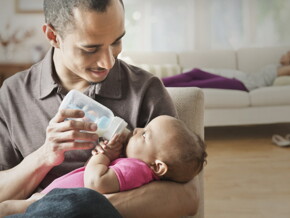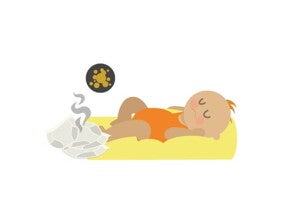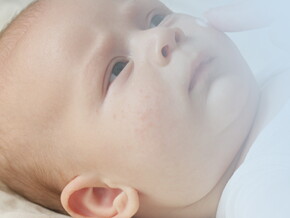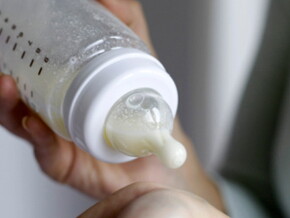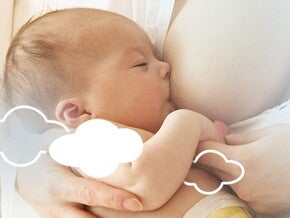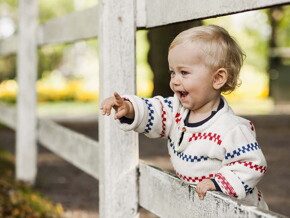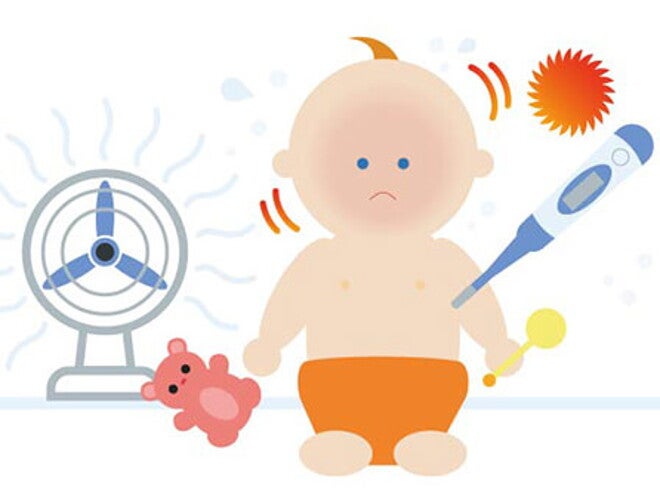
Common Newborn Conditions
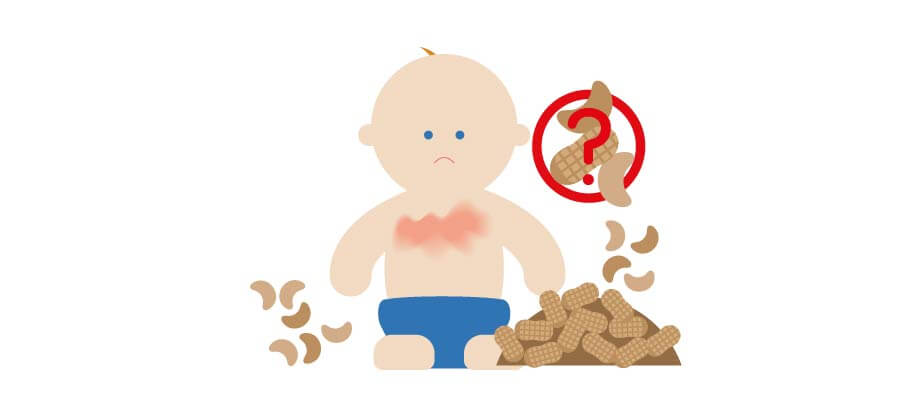
Allergies
What are allergies in babies?
An allergy means your body’s immune system overreacts to a normally harmless substance like pollen or foods such as nuts, cow’s milk, eggs, or wheat, seeing it as a threat and producing antibodies to fight it.
The result is an allergic reaction with symptoms such as:
- Itchy mouth and throat
- Hives (itchy bumps on the skin)
- Stomach discomfort (diarrhea, cramps, and/or vomiting)
- Swelling of the face or tongue
- Trouble breathing
The chances of a baby developing an allergy increase if there is a family history of it. Many kids outgrow their food allergies, especially if the allergy started before 3 years of age; however, sometimes allergies don’t go away.
How to help reduce the risk of allergies in babies
Breastfeeding
Breastfeeding exclusively until your baby is around 6 years of age, and continuing to breastfeed them while you introduce other foods is the best way to feed a newborn and reduce the risk of developing allergies.
Breast milk also contains antibodies that help support your baby’s developing immune system. It’s important for you to know that there’s no evidence that avoiding certain foods – like milk, egg, or peanut – while breastfeeding will prevent allergies in your baby. If you’re formula-feeding, use a store-bought cow’s milk based infant formula.
Select foods
When it comes to introducing solid foods, the latest advice for healthy babies not previously diagnosed with allergies, is to give them iron-rich first foods and to introduce common allergenic foods such as:
- Eggs;
- Peanuts;
- Wheat;
- Fish
These foods should be given in small amounts, in developmentally appropriate textures, from about six months of age, but not before four months. This may help reduce your baby’s risk of developing allergies.
Offer potential allergens no more than 1 per day. Wait 2 days before trying another. Once you offer the foods, continue to give them on a regular basis.
Talk to your doctor if you have any concerns about food allergies in your baby.
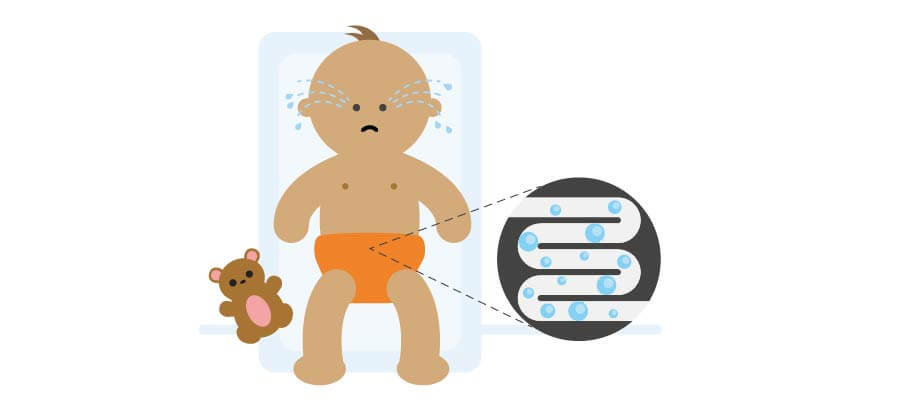
Colic and crying
What is colic?
Colic is a common term used for young babies—generally those under three months—who cry a lot. This condition occurs both in formula-fed and breastfed babies. I
How to help relieve colic and crying
Probiotic L.reuteri
Studies have shown that babies with colic who are given probiotic L. reuteri cry less compared to babies who did not take the probiotic. Probiotic L. reuteri is available as probiotic drops and in certain infant formulas.
Other ways to help colicky babies
All babies cry, but your baby may have colic if they cry for more than 3 hours a day, at least 3 times a week, for over 3 weeks. Ways to help include:
- Swaddle your baby in a dryer-warmed blanket and rock them side-to-side
- Speak to them softly, sing a lullaby, or have them listen to soft music
- Walk them around in your arms, in a baby carrier, or in a stroller
- Give them a bath
- Place them face down, and pat or rub their back
- Keep a diary of symptoms to share with your doctor
Remember, while some babies may cry more than others and colic can be difficult, they’ll eventually grow out of it. Always talk to your doctor if you have any questions or concerns about your baby’s crying or development.
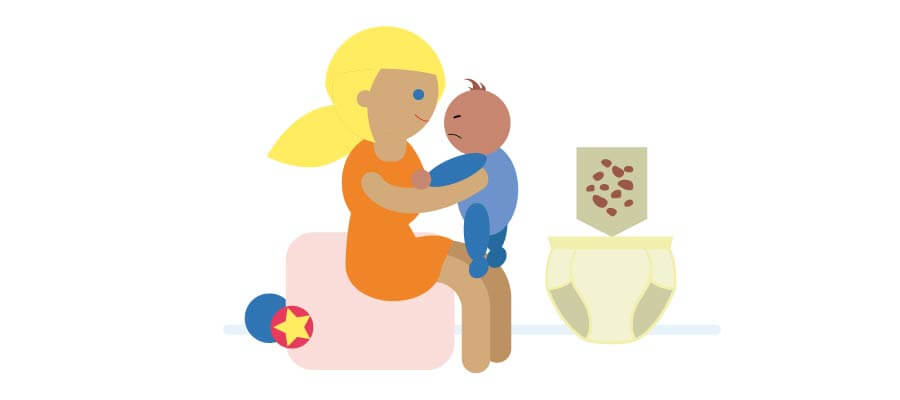
Constipation
What is constipation in babies?
Your baby may poo once a day or once every few days. Remember that every baby is different. In general, breastfed babies poo more often than formula-fed babies.
Signs of constipation to look for include:
- Dry or hard and pebble-like poo
- Less frequent dirty diapers
- Poo is painful to pass
- Loss of appetite
- Blood on the surface of a hard poo
How to help with baby constipation
Fluids
It’s important to ensure baby gets enough fluids (see dehydration) through breastfeeding and/or formula feeding. Make sure that you are preparing the infant formula correctly.
Physical activity
Physical activity, play, and tummy time can also help with constipation. Physical activity can help relieve your baby’s constipation by promoting digestion and strengthening abdominal muscles. Some activities that can help ease constipation include:
- Tummy time
- Gentle leg bicycling
- Baby belly massages
Prebiotics
Prebiotics called FOS (fructo-oligosaccharides) and GOS (galacto-oligosaccharides) are dietary fibres that stimulate the growth of healthy bacteria in the gut and provide gentle relief of constipation and irregularity.
Breast milk also naturally contains special prebiotics called human milk oligosaccharides (HMOs). Certain infant formulas may also contain GOS, 2’-FL HMO, or other prebiotics. You will also find GOS and FOS in some pediatric supplements for constipation relief such as Gerber® Supplements for Baby Constipation Relief.
Balanced diet [At 6+ months]
To help prevent constipation in toddlers, ensure they are being offered a balanced diet that includes whole grains, fruits and vegetables. These foods have fibre, which acts as a natural laxative and helps with water absorption in the body.
If you are concerned that your baby is constipated, talk to your doctor.
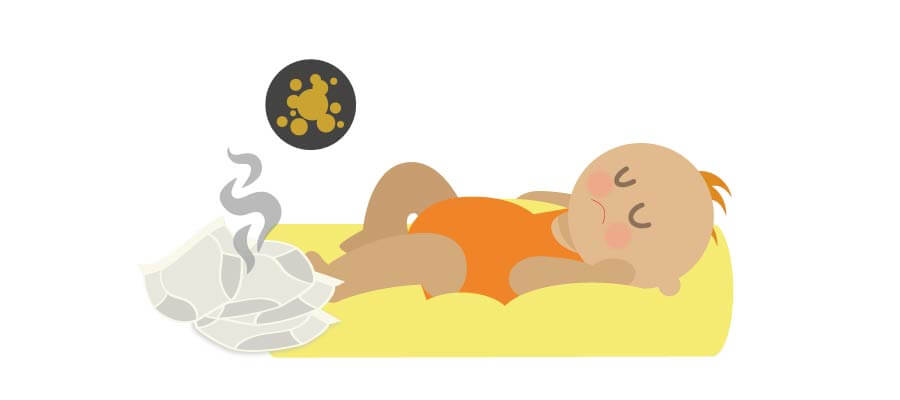
Diarrhea
What is diarrhea in babies?
Baby diarrhea can be a common condition in babies, most often caused by viruses and can spread from person to person – or child to child – with poor hygiene.
Diarrhea germs spread quickly among children who are not yet potty trained. Sometimes diarrhea can happen if your baby or toddler is taking antibiotics. While antibiotics kill the ‘bad’ bacteria that is causing illness, they can also kill some ‘good’ bacteria which results in an imbalance of the gut microbiota.
A child has diarrhea if they have more bowel movements than usual, and the stools are unusually loose or watery. This usually occurs at least three times in a 24-hour period. Sometimes your little one will also have a fever, nausea, vomiting, stomach pains, cramps, and/or blood or mucous in their bowel movement.
How to help with baby diarrhea
Good hygiene
Frequent handwashing, good hygiene for you and your little one, disposing of diapers safely, and safe food handling can all help stop the spread of diarrhea.
Fluids
Give plenty of liquids to your baby if they have diarrhea. Continue to breastfeed or formula feed on demand and, if you are formula feeding, do not dilute the formula.
For older children, offer a variety of fluids frequently and avoid giving sugary drinks or those containing artificial sweeteners. If your child is not taking fluids well, offer an oral rehydration solution too.
Diaper changes
Diarrhea can cause diaper rash, so change your baby straight away—a warm damp cloth or cotton ball is gentler than wipes—and give her skin a few minutes to breathe before putting a new diaper on.
Probiotics
Some probiotic strains have been found to help manage episodes of diarrhea in children. Studies show that a probiotic called LGG helps to prevent and manage certain types of diarrhea in infants and children.. You can find pediatric supplements with LGG to help manage diarrhea, like Gerber® Supplements for Baby Diarrhea Relief, at many pharmacies.
Talk to your child’s doctor
Always seek medical help if you have any concerns about your little one’s diarrhea or that they may be dehydrated.
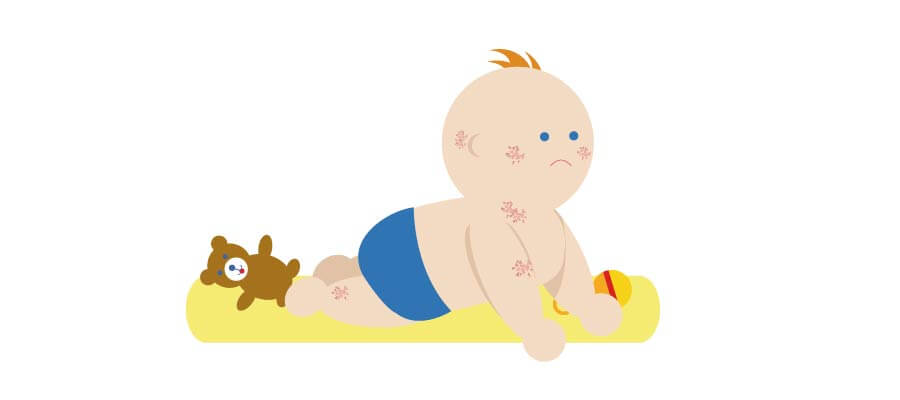
Eczema
What is eczema in babies?
Eczema—a condition that causes the skin to become itchy, red, dry, and cracked—may develop in the first year of a baby’s life. Sometimes eczema is triggered by allergies.
Eczema usually appears on a baby’s forehead, cheeks or scalp. It can sometimes spread to other parts of the body.
How to help with eczema
Warm baths
Giving your baby a warm bath every day and allowing them to soak can be beneficial for their skin. Following the bath, gently pat your baby's skin dry instead of rubbing, and then apply a fragrance-free moisturizer such as petroleum jelly to help retain moisture in the skin.
Dress them in loose cotton clothes
Opt for loose clothing made from cotton when dressing your baby. Steer clear of wool materials as these can irritate their skin.
Talk to your child’s doctor
Speak to your healthcare provider if you think your baby has eczema. They will be able to advise on strategies and treatments to help soothe and manage your baby’s eczema.
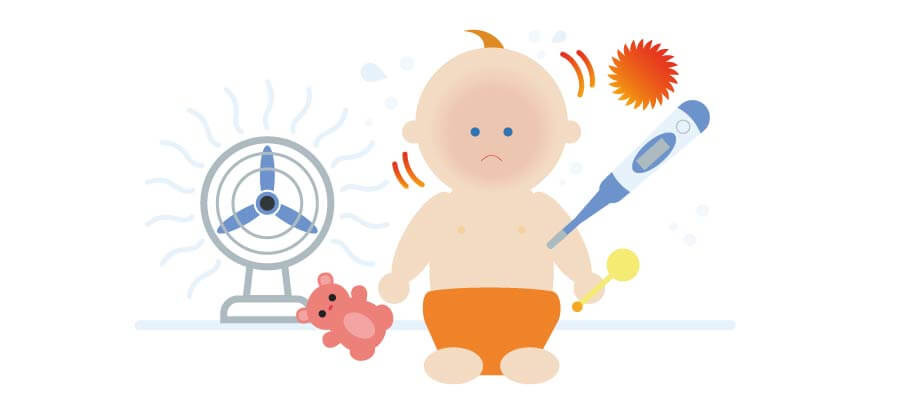
Fever
What is a fever in babies?
Normal baby temperature will vary with age, activity, and the time of day. When your child is sick with either a viral (like a cold or the flu) or bacterial infection, it is common to also have a fever. Usually, fevers go away after 3 days (72 hours) or less.
A fever itself is not an illness—it’s a sign your baby is trying to fight an infection. This might be caused by a virus, such as a cold or the flu, or bacteria. It can also arise alongside constipation and diarrhea.
How to help a baby with a fever
Babies younger than 6 months should see a doctor when they have a fever.
Talk to your child’s doctor
Talk to your child’s doctor immediately if your child under 6 months has a fever, or your older child has had a fever for 48-72 hours. Contact your doctor if you have any other concerns about your little one’s well-being.
Fluids
Older children can be treated at home – if they seem otherwise well or are improving. They should see a doctor if their fever lasts for more than 48-72 hours. Ensure that your little one with a fever is getting enough fluids.
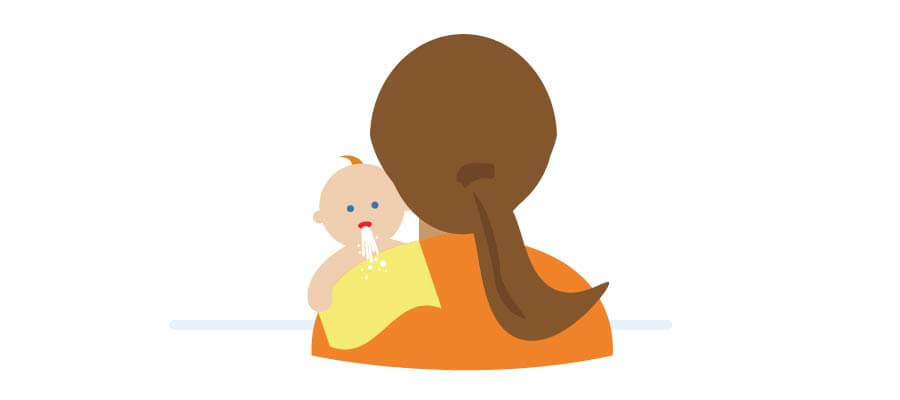
Reflux
What is reflux in babies?
Most babies have reflux which may include spitting up, burping, and/or vomiting after feeding, especially in the early weeks and months. This is infant reflux, and happens because baby’s esophagus isn’t fully formed yet, making it hard to keep milk down. It’s normal and usually resolves after a few months and by the time they can eat solid foods.
How to help with reflux in babies
Feeding hacks
Some ‘feeding hacks’ you can do to help prevent reflux in babies include:
- offering smaller feeds more often
- burping during the middle and at the end of feeds
- keeping baby upright after feeds
Also make sure there is nothing pressing on their tummy after feeding, so avoid strapping them into their car seat or bouncer chair.
Probiotic L. reuteri
A specific probiotic, L. reuteri, has also been found to decrease the number of spit-ups in young babies. Ask your healthcare provider for advice on this or any other reflux concerns.
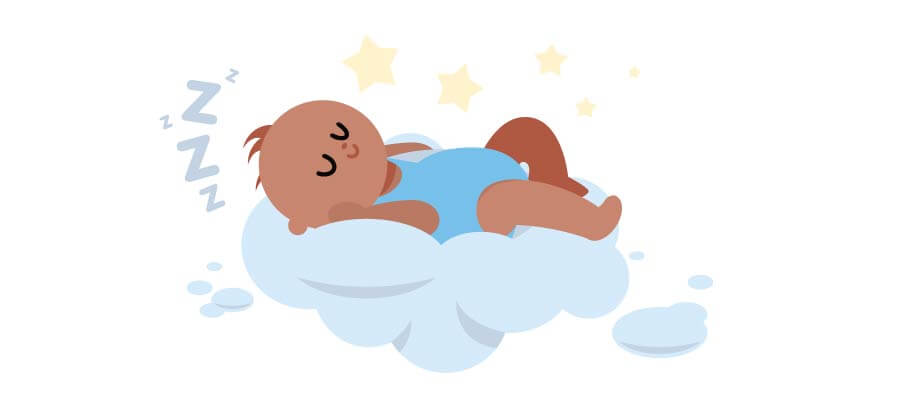
Sleep challenges
What are baby sleep challenges?
During the first couple of months, your baby will wake often during the night for feeding—their tummy is very small at this stage and can’t hold much milk.
How to help with baby sleep challenges
Safe sleep
Good sleep habits include safe sleep. The safest place for your baby to sleep is on their back, in a crib, cradle or bassinet that is in your room. This will help protect against SIDS and make feeding at nighttime simpler.
Bedtime routine
Babies with a regular bedtime routine and consistent sleep schedule are more likely to learn good sleep habits that last into childhood. It could be bath, brush teeth, and story—it’s up to you, just make sure you do the same thing every night. Putting your baby down when they are sleepy but still awake will also help them get used to falling asleep by themself.
Identify the cause
If your baby is waking several times during the night after the first few months, it could be due to several reasons. Rather than immediately feeding them, ask yourself the following questions:
- Does their diaper need to be changed?
- Do they need burping?
- Do they seem in discomfort such as colic?
- Are they too hot or cold?
If the answer is no to all of these, and you also know they’re not hungry, they can gradually learn to soothe themself back to sleep. This will help reduce the number of times they wake wakes up in the future.
Sources
Canadian Paediatric Society. Caring for Kids. Food allergy vs. food intolerance: What is the different and can I prevent them? March 2021. Accessed June 2023. Food allergy vs. food intolerance: What is the difference and can I prevent them? | Caring for kids (cps.ca)
Abrams EM, et al. Canadian Paediatric society. Dietary exposures and allergy prevention in high-risk infants. Allergy Asthma Clin Immunol. 2022;18(36) https://doi.org/10.1186/s13223-021-00638-y
Chau K, et al. Probiotics for infantile colic : a randomized, double-blind, placebo-controlled trial investigating Lactobacillus reuteri DSM 17938. J Pediatr. 2015;166(1):74-78.
Canadian Paediatric Society. Caring for Kids. Healthy bowel habits for children. March 2018. Accessed June 2023. Healthy bowel habits for children | Caring for kids (cps.ca)
Canadian Paediatric Society. Caring for Kids. Dehydration and diarrhea in children: Prevention and treatment. July 2018. Accessed June 2023. Dehydration and diarrhea in children: Prevention and treatment | Caring for kids (cps.ca)
Canadian Paediatric Society. Caring for Kids. Your baby’s skin. July 2022. Accessed June 2023. https://caringforkids.cps.ca/handouts/pregnancy-and-babies/your-babys-skin#:~:text=Eczema,The%20rash%20is%20often%20itchy.
Canadian Paediatric Society. Caring for Kids. Fever and temperature taking. June 2022. Accessed June 2023. https://caringforkids.cps.ca/handouts/health-conditions-and-treatments/fever_and_temperature_taking
Garofoli F, et al. The early administration of Lactobacillus reuteri DSM 17938 controls regurgitation episodes in full-term breastfed infants. Int J Food Sci Nutr. 2014;65(5):646-648.
Canadian Paediatric Society. Caring for Kids. Safe sleep for babies. October 2021. Accessed June 2023. Safe sleep for babies | Caring for kids (cps.ca)




